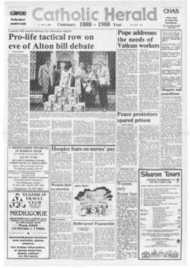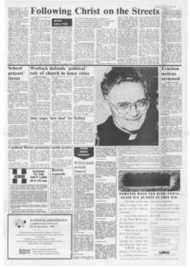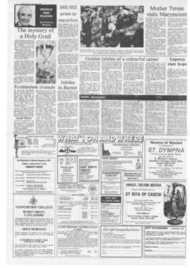Page 2, 6th May 1988
Page 2

Report an error
Noticed an error on this page?If you've noticed an error in this article please click here to report it.
Tags
Share
Related articles
National Nuclear Policy Fails To Match Up To Catholic...
Arms Debate Still Rages In United States
Bishops Urge The Government To Abandon Nuclear Deterrent
Us Bishops Curb Hard Peace Line
The Likelihood Of Government Crime
US bishops look at nuclear issue
THE Catholic bishops of the United States should neither condemn nuclear deterrence outright nor "accept it as selfregulating or normal," according to a draft report by the US bishops' Ad Hoc Committee for the Moral Evaluation of Deterrence.
The report, released earlier this month says the US Soviet summit last December has raised "cautious hopes" for arms control, but some nuclear policies and strategies of the superpowers must still be changed. The nation's bishops are to make recommendations on the report in writing to the committee, then debate and vote on a second draft of the report when they meet in June in Collegeville.
The committee was formed in
1985 to evaluate changes in US nuclear policy since the bishops issued their 1983 pastoral letter, The Challenge of Peace, which said that any moral acceptance of nuclear deterrence had to be "strictly conditioned" by the morality of the policies and strategies underlying a nation's deterrence posture.
Some bishops who called for the new evaluation had argued that US policies increase the risk of a preemptive first strike or destabilise the nuclear balance. Both superpowers, it says, "are deploying weapons which, in both number and kind, run contrary to the conditions" which the US bishops set out in their 1983 peace pastoral as prerequisites for a morally acceptable nuclear deterence policy.
blog comments powered by Disqus











